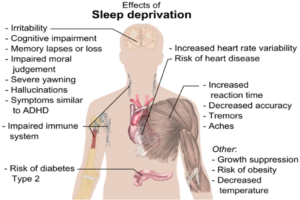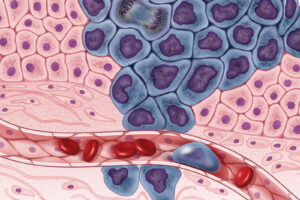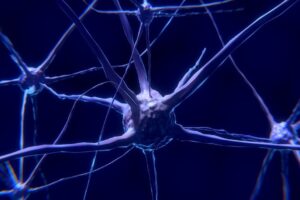
Figure 1: This figure describes the physiological and cognitive effects of sleep deprivation
Source: Wikimedia Commons
Procrastination involves delaying tasks that one intends to do, and many people struggle with it in their everyday lives. According to Katrin Klingsieck, a researcher at the University of Paderborn in Germany, as many as 70% of university students consider themselves procrastinators. Procrastination is associated with negative outcomes such as stress, illness, and poor academic performance (Tice & Baumeister, 1997). Because these outcomes are also associated with sleep deprivation, which is a lack of sleep over a period of time or getting less than the optimal amount of sleep (Ranasinghe et al., 2018), researchers have considered how procrastination affects sleep in postsecondary students. A team of biobehavioral researchers from Harvard University and Pennsylvania State University led by Xiaoyu Li found that greater levels of procrastination are associated with negative sleep outcomes. As part of a larger study on mental health, the group obtained data from over 8000 undergraduate and graduate students who completed a survey asking them about their sleep and their tendency to procrastinate. They found that students who procrastinated a greater amount slept more on weekends than on weekdays and that procrastination was also associated with shorter sleep and worse sleep quality (Li et al., 2020).
These results suggest that procrastination often leads to sleep deprivation, which is associated with disruptions in immune system function and hormonal secretion as well as an increased risk of obesity, diabetes, and cardiovascular disease (Orzeł-Gryglewska, 2010). Even mild to moderate sleep deprivation is associated with an increase in impulsivity and a decline in cognitive performance and positive emotions (Saksvik-Lehouillier et al., 2020). From the results of their study, the research team led by Xiaoyu Li concluded that interventions that equipping students with strategies to prevent and manage their procrastination may help improve their sleep health and fight sleep deprivation (Li et al., 2020).
Camille Scent, a psychotherapist, and Susan Boes, a researcher at the University of West Georgia, developed a brief intervention to reduce procrastination. The researchers had university students participate in two group workshops where they discussed their experiences with procrastination and the costs associated with putting things off. The students also took part in group exercises where they learned skills such as ‘defusion techniques’, which are designed to reduce procrastination by separating the thought of procrastinating from the actual behavior itself (Scent & Boes, 2014). After interviewing the participants, the researchers found that most students self-reported a decrease in procrastination behaviors and stated that they would recommend the workshop to others (Scent & Boes, 2014). In another study, Lauren Hensley and Karleton Munn, researchers from Ohio State University and The University of Utah, developed a journaling intervention for college students struggling with procrastination that involved maintaining journals twice a week for three weeks about their experiences when procrastinating and taking part in interviews where they discussed their writing. They found that participants reported gaining awareness of their procrastination behaviors and felt motivated to change their behaviors (Hensley & Munn, 2020).
Although putting off studying for an exam or writing a big paper may not seem like a big deal, the truth is that postponing important tasks can lead to students being deprived of much-needed sleep. The link between procrastination and sleep means that those who engage in the behavior may experience consequences like impaired cognitive performance and an increased risk for chronic diseases like obesity, diabetes, and cardiovascular disease (Orzeł-Gryglewska, 2010). Since not getting enough sleep can also be detrimental to well-being and academic performance, researchers have developed and tested interventions to help students prevent and manage procrastination behaviors. Their success in initial studies shows that these interventions have the potential to help students fight sleep deprivation due to procrastination.
References
Hensley, L. C., & Munn, K. J. (2020). The power of writing about procrastination: Journaling as a tool for change. Journal of Further & Higher Education, 44(10), 1450–1465. https://doi.org/10.1080/0309877X.2019.1702154
Klingsieck, K. B. (2013). Procrastination. European Psychologist, 18(1), 24–34. https://doi.org/10.1027/1016-9040/a000138
Li, X., Buxton, O. M., Kim, Y., Haneuse, S., & Kawachi, I. (2020). Do procrastinators get worse sleep? Cross-sectional study of US adolescents and young adults. SSM – Population Health, 10, 100518. https://doi.org/10.1016/j.ssmph.2019.100518
Orzeł-Gryglewska, J. (2010). Consequences of sleep deprivation. International Journal of Occupational Medicine and Environmental Health, 23(1), 95–114. https://doi.org/10.2478/v10001-010-0004-9
Saksvik-Lehouillier, I., Saksvik, S. B., Dahlberg, J., Tanum, T. K., Ringen, H., Karlsen, H. R., Smedbøl, T., Sørengaard, T. A., Stople, M., Kallestad, H., & Olsen, A. (2020). Mild to moderate partial sleep deprivation is associated with increased impulsivity and decreased positive affect in young adults. Sleep: Journal of Sleep and Sleep Disorders Research, 43(10), 1–10. https://doi.org/10.1093/sleep/zsaa078
Scent, C. L., & Boes, S. R. (2014). Acceptance and Commitment Training: A Brief Intervention to Reduce Procrastination Among College Students. Journal of College Student Psychotherapy, 28(2), 144–156. https://doi.org/10.1080/87568225.2014.883887
Tice, D. M., & Baumeister, R. F. (1997). Longitudinal Study of Procrastination, Performance, Stress, and Health: The Costs and Benefits of Dawdling. Psychological Science, 8(6), 454–458.
Related Posts
The Connections Between Sleep and Memory
Figure: The image above displays the effects of sleep deprivation...
Read MoreSingle Cell RNA Sequencing Enhances Understanding of Tumor Genetic Diversity
Figure 1: Researchers have shown that tumor cells are a...
Read MoreNew ALS Treatments in Development: Stem Cell Therapy and Neuronal Replacement
For more neuroscience news, check out Akshaya’s organization on neuroscience...
Read MoreVincent Lai



